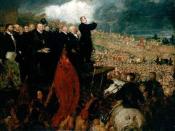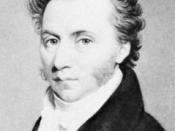Before 1832 peoples political opinions were valued depending on their class. The upper classes and aristocracy had most influence as they were wealthy and owned properties. The Great Reform Act was an attempt to give lower classes more rights and power, which the upper classes were not in favour of but eventually agreed to in 1832 for many reasons.
The French Revolution, where upper classes and royalty were killed, imprisoned and over powered, had occurred recently in 1789. Royals throughout the world were fearful of revolution in their own countries. Middle and Lower classes did not have representatives in Parliament, and therefore there needs and interests we not met or understood. Upper classes liked the system this way, but wanted to destroy the possibility of revolution. They believed that the passing of the Reform Act would do just this, increasing slightly the influence of middle and working classes, and splitting the alliance that had been formed between the two classes.
There was great pressure from the working class. The National Union of the Working Classes was founded by William Lovett and Henry Hetherington. They would campaign for the right to be represented in Parliament. The working class made up most of the population of Britain at the time, but were considered insignificant, and were not involved in politics or parliament. Therefore pressure from the working class had little effect on upper classes, mainly due to the fact that people from the working class were thought of as too poor to have a place in parliament, and insignificant to the governmental system which should only be controlled by the rich. This was a time where money equalled power, and as the working class had very little money, they were given very little power.
There was also immense pressure from middle...


